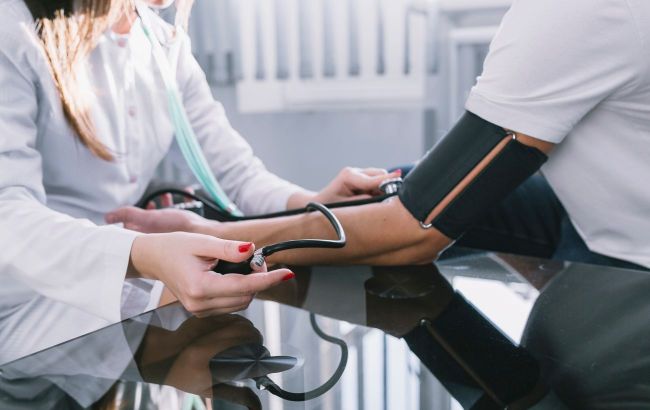How to lower blood pressure without medication: Advice from doctors
 How to reduce high blood pressure without medication (photo: freepik.com)
How to reduce high blood pressure without medication (photo: freepik.com)
High blood pressure increases the likelihood of a heart attack and stroke. It's important to know your numbers because you'll want to lower those figures if you have high blood pressure. There are several available ways to do this by making lifestyle changes.
How to lower high blood pressure and what to do is explained by RBC-Ukraine with reference to WebMD.
Lose weight
You can reduce your systolic blood pressure (the first number in blood pressure measurement results) by 5-20 points for every 20 kg lost. In fact, if you are overweight, losing just 10 kg can help lower your blood pressure.
Weight loss also helps with sleep apnea, where your breathing briefly stops multiple times during sleep. (This can raise your blood pressure and cause your heart to beat irregularly.) Shed the pounds gradually, combining healthy eating with regular physical activity.
If you keep an eye on your weight, your blood pressure will take care of itself. Regularly monitor your readings at home and strive to stay within the target range.
Eat healthy
The program called DASH (Dietary Approaches to Stop Hypertension) is widely considered one of the best diets for controlling and reducing blood pressure. Follow it and observe how your systolic blood pressure drops by 8-14 points.
Its main rules include avoiding or reducing:
- Foods high in total and saturated fats
- Processed foods
- Sugar
- Salt
- Carbohydrates
- Caffeine
- Alcohol (no more than one drink per day for women, two or less for men)
Instead, the diet suggests consuming:
- Fruits and vegetables, especially berries rich in antioxidants
- Whole grains
- High-protein foods like unsalted nuts
- Foods high in potassium and magnesium, such as leafy greens or beans
- Calcium-rich foods like low-sugar yogurt.
Exercise regularly
Physical activity is a companion to proper nutrition. You are more likely to lose weight if you engage in sports and maintain a healthy diet. Official recommendations suggest at least half an hour of exercise on most days of the week.
The consequences can be dramatic: blood pressure can decrease by 4-9 points. Remember that exercising is not just about going to the gym. It can be gardening, washing your car, or doing household chores.
However, activities that increase heart rate, such as aerobic exercises like walking, dancing, jogging, cycling, and swimming, are best for your heart.
Reduce salt
Intake Salt is the primary culprit behind elevated blood pressure. The American Heart Association recommends that individuals with hypertension consume less than 1500 milligrams per day.
Check product labels to find out how much you are getting. If you gradually reduce your intake, you are unlikely to notice the difference. Limiting sodium intake to 2400 milligrams per day can lower your reading by 2-8 points.
One way to cut costs is to cook at home. Seventy-five percent of your sodium intake comes from food outside the home and packaged products.
Use more spices for flavor instead of salt. Consuming more potassium (found in foods such as bananas, raisins, tuna, and milk) helps flush sodium out of the body. A little effort can lower blood pressure by two to eight points.
Ways to eliminate hidden salt and add healthy flavor:
- Read labels. Look for salt, sodium, sea salt, and kosher salt.
- Rinse salty canned goods like beans or tuna before consumption.
- Substitute sodium and salt in cooking with herbs and spice
- Avoid quick-cooking or flavored side dishes, which often contain a lot of sodium. Instead, try preparing plain rice, pasta, or grains without adding salt. You can enhance the flavor with other seasonings or a small amount of salt when serving.
- Look for the low sodium label on food product labels.
Reduce your stress
Reducing stress helps maintain normal blood pressure. Try mind and body exercises such as yoga and tai chi.
Meditation can help cope with stress, as well as listening to soothing music or creating music. One study showed that music has the same benefits as physical activity.
Sitting in the sun can increase levels of feel-good hormones called endorphins and lower blood pressure.
And don't forget your support network. Rely on friends and family to lift your spirits.
Other things you can try to cope with stress include:
- Setting realistic daily goals. Identify your priorities and don't force yourself to do too much.
- Control what you can: see if there's anything you can do about things that cause you the most stress. Sometimes, exchanging ideas with a colleague or family member can help find solutions.
- Stay away from stressors. If you know something or someone causes you stress, do everything possible to avoid them.
- Find time for yourself: take a break during the day to do something you enjoy. Perhaps take a walk or find a quiet place to meditate or take deep breaths.
- Appreciate the little things. Being grateful and expressing gratitude can make you feel better and lift the mood of those around you.
Drink less alcohol
Systolic blood pressure can be lowered by 2-4 points by limiting alcohol to one drink per day (for women) or two drinks (for men). One drink is 300 ml of beer, 150 ml of wine, or 45 ml of strong spirits.
Quit smoking
Quitting smoking is arguably the best thing you can do for your heart and overall health. Smoking not only harms you in the long term but also raises your blood pressure every time you smoke a cigarette. Lower your blood pressure and extend your life by giving up smoking. If you need help to quit, talk to your doctor.
Take prescription medications
While some people can manage blood pressure through lifestyle changes, many others also need medications. It's crucial to take the prescribed medications exactly as directed by the doctor. This means not reducing doses or skipping days. If you have trouble remembering, use electronic reminders or daily pill organizers.
Consider taking vitamins and supplements
Research suggests that certain vitamins and minerals may help lower blood pressure. However, it's essential to talk to your doctor before taking anything. Make sure they are aware of what you are taking.
-
Vitamin C: Contains antioxidants that protect the walls of blood vessels. Good sources include orange juice, fruits like kiwi and strawberries, and vegetables such as broccoli, cabbage, tomatoes, and sweet red peppers. Adults should aim for 400 mg per day.
-
Potassium: Helps the body get rid of sodium through urine. Men should aim for around 3400 mg per day, and women about 2600 mg. It is found in fruits like bananas and prunes, as well as vegetables like potatoes, tomatoes, and artichokes.
-
Vitamin D: Helps produce the enzyme renin, which is linked to blood pressure health. You can get vitamin D from fatty fish like salmon or mackerel, or from milk. You can also absorb vitamin D from sunlight or take it as a supplement.
Get adequate sleep
Like other bodily functions such as heart rate and respiratory rate, your blood pressure decreases when you sleep. If you don't get enough sleep, it means your blood pressure stays elevated for a longer time. Lack of sleep may also impact your body's ability to regulate stress hormones, playing a role in blood pressure control.
To ensure good sleep, it's best to adhere to a regular schedule, engage in physical activity earlier in the day, and avoid eating or drinking right before bedtime.
We also talked about why a person needs potassium and where to find it.
This material is for informational purposes only and should not be used for medical diagnosis or self-treatment. Our goal is to provide readers with accurate information about symptoms, causes, and methods of detecting diseases. RBС-Ukraine is not responsible for any diagnoses that readers may make based on materials from the resource. We do not recommend self-treatment and advise consulting a doctor in case of any health concerns.

